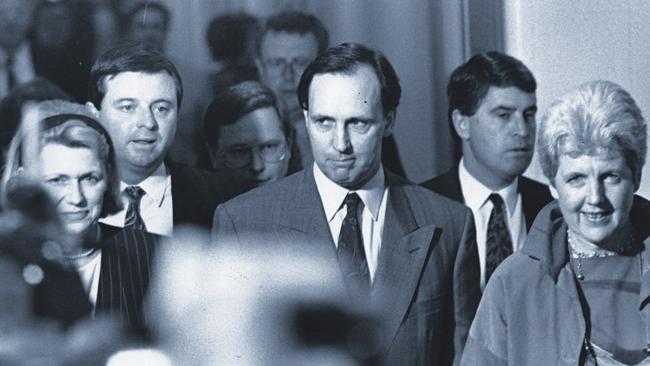Cabinet papers 1990-91: Hawke, Keating have no regrets
The two Labor giants waged one of Australian politics’ most bitter, and spectacular, leadership battles.
The Hawke-Keating partnership that delivered a series of landmark economic reforms and gave Labor four election victories spectacularly shattered in 1990-91, but the two men who waged one of Australian politics’ most bitter leadership battles have no regrets.
“Paul did a lot of good things as treasurer, but I had the view, and still have the view, that I was the best person suited to lead the government to the 1993 election and remain as prime minister,” Bob Hawke told The Australian.
“I was not prepared to carry the primary leadership responsibility for the direction of the government for another few years,” Paul Keating said. “I said, ‘Enough is enough. If the factional leaders want Hawke and Keating as a team, they can’t have them any more’ — it was one or the other.”
A key flashpoint was Mr Keating’s off-the-record address to the National Press Club on December 7, 1990, offering an extended rumination on the meaning of political leadership and referring to himself as the “Placido Domingo” of Australian politics. He said it was not an attack on Mr Hawke.
But Mr Hawke saw it that way. After a tense three-hour meeting days later, a joint statement was issued supporting Mr Hawke’s intention to remain as prime minister for the rest of the term.
At a subsequent meeting on January 31, 1991, Mr Hawke told Mr Keating he was backing out of their secret Kirribilli agreement. In November 1988, they had met at the prime minister’s Sydney residence, Kirribilli House, where Mr Hawke agreed to hand over the leadership after the 1990 election.
“The truth was he never intended, ever, to give me the leadership,” Mr Keating said. “The Kirribilli agreement was a device used by Bob to get three years of peace from me from the end of 88 to 91 on a false promise.”
On May 30, after the Kirribilli agreement leaked, Mr Keating launched a leadership challenge.

A caucus ballot on June 3 saw Mr Hawke win by 66 votes to 44. Mr Keating went to the backbench. “I thought it was all over,” Mr Keating recalled.
The government, however, struggled to regain political momentum. Then opposition leader John Hewson led in the polls. Treasurer John Kerin became accident prone. Cabinet split over mining at Coronation Hill.
Despite six senior ministers urging Mr Hawke to fall on his sword on December 6, he defiantly fought on.
Mr Keating said by this time he had packed up his office and was planning a post-politics career. “I was going to resign at the end of January 91. What destroyed Bob was the inept response to Hewson’s Fightback package. The government was struck dumb.”
The Labor caucus met on December 19. Prevailed on to mount a second challenge, Mr Keating defeated Mr Hawke by 56 votes to 51, and claimed the Labor leadership and the prime ministership.
While the passage of years has not altered their views, both men have a residual respect for what they achieved together in government — unlike recent leadership contests on both sides of the political divide.
“Bob and I had a long friendship, a long professional and personal friendship,” Mr Keating said. “I didn’t want to have to fight Bob for the leadership; I wanted him to pass it over as he said he would.”
Mr Hawke told The Australian he “was almost certain” he would face a leadership challenge after he refused to appoint Labor powerbroker Graham Richardson to the transport and communications portfolio in 1990. Mr Hawke was concerned about his dealings with transport firms and thought this appointment would risk the government’s reputation.
Despite being the first Labor leader to be defeated in a partyroom ballot, Mr Hawke stressed he had not let himself be consumed by bitterness. The disappointing end to his time as PM enabled him to marry his second wife, Blanche d’Alpuget. “I don’t see any point in bitterness, envy and all that stuff and I’m quite happy to live on my record,” Mr Hawke said.
“And I’m quite genuine in saying that I was able, as a result of losing the leadership, to marry the woman I had fallen in love with.”





To join the conversation, please log in. Don't have an account? Register
Join the conversation, you are commenting as Logout